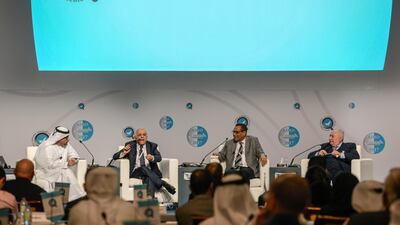Political Islam has no future in the region and religion should be kept separate to politics, experts said on Monday on the closing day of the Abu Dhabi Strategic Debate.
"Over the past year, Daesh has dominated large areas of Iraq and Syria," said Dr Abdullah Abah, professor of philosophy and social studies at the University of Nouakchott. "But we are now seeing its military defeat so political Islam has entered into a dilemma.
"It was a destructive power in the civil society of many Arab countries, we saw a lot of sectarianism and divisions in the political arena but there is an end of the embracing of political Islam movements."
Political Islam came to fill a vacuum in the region, caused by failed secular ideologies which dominated a large part of the Arab world, including pan-Arabism and socialism. "It was used to fight communism in the region and the Soviets in Afghanistan," said Dr Ebtisam Al Ketbi, president of the Emirates Policy Centre, an Abu Dhabi-based think tank which organised the event.
"Policies have been limited to uprooting the phenomenon so far but we must look into the future of political Islam through more effective ways and discussing the roles of countries like Qatar and Iran in feeding it."
Islam is the only religion in the world which includes a military dimension such as jihad and martyrdom. "So they have awoken this giant and we are suffering from this issue," said Dr Mustafa Alani, senior adviser and director of security and terrorism at the Gulf Research Centre.
____________
Read more:
American policy in Middle East 'ambiguous and chaotic', experts say
____________
"We cannot defeat it completely in the future – it can only be fought by moderate Islam, not by secular thinking. But without dealing with this phenomenon, we won't get rid of extremism."
Studies have shown that Europe has been the main fuel for Daesh, from countries such as the United Kingdom and Germany. "It's strange," Dr Abah said. "[Some] are of Islamic origin but a third of these terrorists are not Muslim – they are of European origin."
They called on keeping religion separate from politics to ensure stability in countries such as Syria, Yemen and Libya. "I hope we can keep Islam away from politics because Western countries developed after dividing religion from the state," Dr Alani said. "The reality on the ground is completely different [here].
"Daesh was a product that came out of a lack of justice so they are a product of political situations.”
Al Qaeda was established after the Soviet invasion of Afghanistan and Daesh was born after the US invasion of Iraq.
"Militias supporting these terrorist groups are another issue," he added. "From Hezbollah in Lebanon to the Houthis in Yemen, the environment has to change. We cannot destroy these terrorist groups without destroying the militias that are backed by Iran."
They were said to exploit Islam to reach power.
It is being manipulated,” said Dr Ridwan Al Sayyid, visiting professor of Islamic studies at The American University of Beirut.
"If you want Islam to be a unifying factor, let us not involve it in politics because then it will be harmful to the religion. Iranians are sabotaging surrounding countries in the name of religion and I don't think there is a future for it."
He said using religion in politics has created divisions in Islam. "Muslims have learned very tough lessons over the past 40 years when we used religion," he said. "It turns us into divided societies and it is a way to mislead us. The Quran was used selectively to disseminate violence around the world so now we need to find out how to regain peacefulness to Islam."
Dr Abah called on the need to reconfigure the political structure of certain Arab countries. "We are now in a crisis," he said. "Political Islam is an intricate part of the problem because it exploits a political system, integrates it in a society and so it becomes a problem for the country. We need to rethink political structures."

